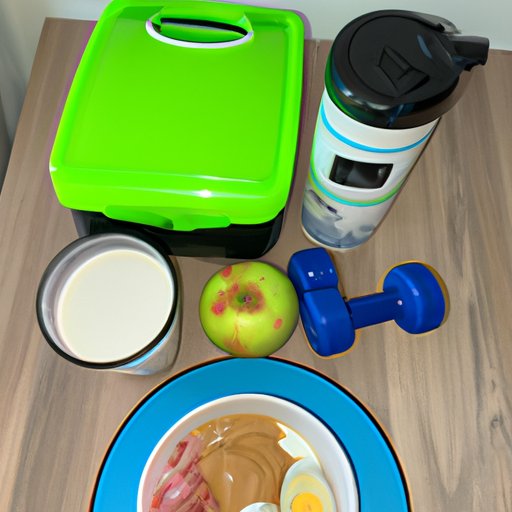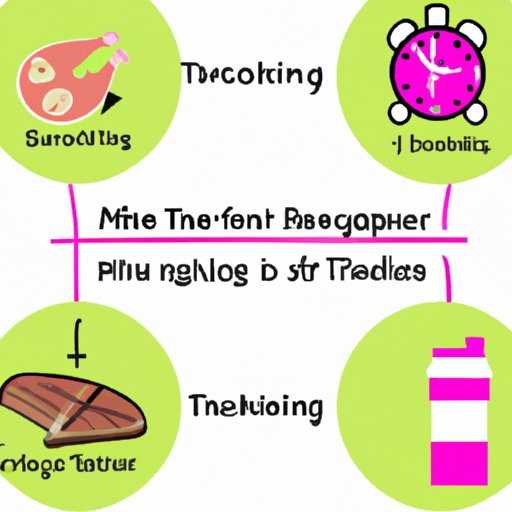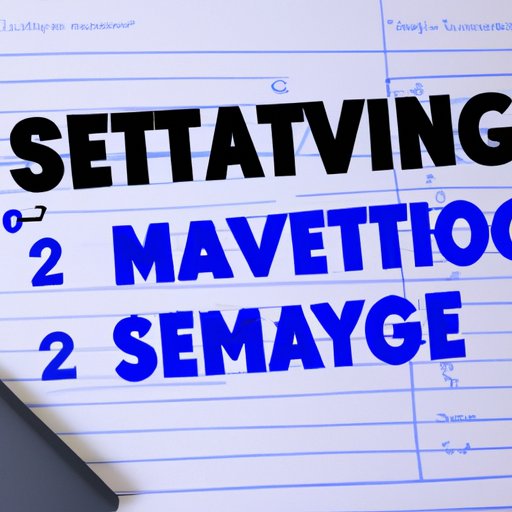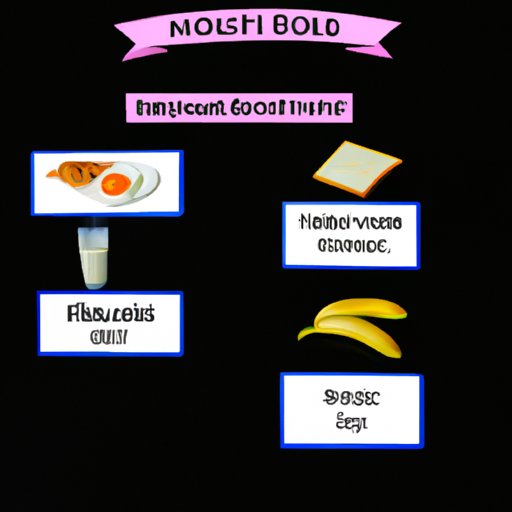Introduction
Working out is an important part of staying healthy and fit. It can help improve your overall physical health, as well as your mental health. But one important factor that many people overlook when it comes to exercise is post-workout nutrition. Eating after a workout is just as important as eating before one. In this article, we’ll explore how long you should wait to eat after working out, and what types of foods are best to eat after a workout.
Eating Before and After Exercise: What You Need to Know
Before we get into how long you should wait to eat after a workout, let’s look at why eating before and after exercise is important. Eating before a workout provides your body with energy to fuel your workout. Depending on the intensity of your workout, you may need more or less energy. Eating after a workout helps your body recover from the stress of exercise and replenishes the nutrients lost during the workout.
Benefits of Eating Before a Workout
Eating before a workout has several benefits. First, it provides you with the energy you need to complete your workout. Eating also helps prevent fatigue during exercise, as well as muscle soreness afterward. Eating a meal or snack before a workout can also help reduce hunger during the workout, so you can focus on pushing yourself to perform your best.
Risks of Eating Too Close to a Workout
Eating too close to a workout can cause digestive issues, such as nausea and stomach cramps. This is because the food takes longer to digest than before, and your body may not have enough time to break down the food before you start exercising. Eating too much or eating the wrong kinds of food can also lead to bloating and discomfort during the workout.

The Best Timing for Eating After a Workout
Now that we’ve discussed why it’s important to eat before and after a workout, let’s talk about the best timing for eating after a workout. Eating after a workout helps your body recover and rebuild itself. The sooner you eat after a workout, the better. This is because the nutrients in the food will be quickly absorbed by your body and used to repair and build muscle.
The “Golden Window” of Post-Workout Nutrition
Experts refer to the period immediately after a workout as the “golden window” of post-workout nutrition. During this time, your body is most receptive to the nutrients in food. Eating within 30 minutes of finishing a workout is ideal, as this gives your body the best chance to absorb the nutrients and start the recovery process.

Factors That Influence the Best Time to Eat After a Workout
There are several factors that can influence the best time to eat after a workout. These include the type of workout you’re doing, the intensity of the workout, your goals, and your individual needs. For example, if you’re doing a high-intensity workout, you may need to eat sooner after the workout. If you’re doing a low-intensity workout, you may have more time to eat after the workout.
How Long Should You Wait to Eat After a Workout?
The general rule of thumb is to eat within 30 minutes of finishing a workout. However, this can vary depending on the type and intensity of the workout. For example, if you’re doing a high-intensity workout, you may need to eat sooner. On the other hand, if you’re doing a low-intensity workout, you may have more time to eat after the workout.

Strategies to Maximize Your Results
To maximize your results, it’s important to plan ahead. Have a post-workout snack ready to go before you start your workout. If you’re doing a high-intensity workout, you may want to have a snack ready to eat as soon as you finish the workout. If you’re doing a low-intensity workout, you may have more time to prepare a meal.
Post-Workout Nutrition: What to Eat and When
When it comes to post-workout nutrition, there are three macronutrients (carbohydrates, proteins, and fats) that are important to consider. Carbohydrates provide your body with energy, proteins help to rebuild muscle, and fats help to slow down the digestion process. Nutrient timing is also important; you want to make sure you’re eating the right foods at the right time to maximize your results.
The Effects of Eating Too Soon After a Workout
Eating too soon after a workout can lead to digestive issues, such as nausea and stomach cramps. Eating too soon can also reduce your performance, as your body won’t have enough time to properly absorb the nutrients in the food. Additionally, eating too soon after a workout can increase your risk of injury, as your body won’t have enough time to recover.
A Guide to Post-Workout Nutrition: How Soon is Too Soon?
Understanding the right amount of time to wait to eat after a workout is important. As a general guideline, you should aim to eat within 30 minutes of finishing your workout. This will give your body enough time to digest the food and absorb the nutrients, while still providing you with the energy you need to perform your best.

Guidelines for Eating After a Workout
If you’re looking for specific guidelines for eating after a workout, here are some tips to keep in mind:
- Eat a snack or meal within 30 minutes of finishing your workout
- Choose a combination of carbohydrates, proteins, and fats
- Avoid processed foods and sugary snacks
- Drink plenty of water to stay hydrated
Maximizing Your Results with the Right Post-Workout Meal
Choosing the right foods to eat after a workout is just as important as timing your meal. Aim to choose a combination of carbohydrates, proteins, and fats. Complex carbohydrates, such as whole grains, fruits, and vegetables, are a great source of energy. Lean proteins, such as fish, chicken, and eggs, are important for rebuilding muscle. Healthy fats, such as nuts and avocado, provide essential fatty acids and help to slow down the digestion process.
Timing Your Meal
In addition to choosing the right foods, it’s important to time your meal properly. Eating within 30 minutes of finishing your workout will give your body the best chance to absorb the nutrients and start the recovery process. If you’re doing a high-intensity workout, you may need to eat sooner after the workout. If you’re doing a low-intensity workout, you may have more time to eat after the workout.
Conclusion
Eating after a workout is just as important as eating before one. Eating within 30 minutes of finishing a workout is ideal, as this gives your body the best chance to absorb the nutrients and start the recovery process. To maximize your results, it’s important to choose the right foods and time your meal properly. With the right post-workout meal, you can ensure your body gets the nutrients it needs to perform its best.
Summary of Key Points
- Eating after a workout is important for recovery and rebuilding muscle.
- Aim to eat within 30 minutes of finishing a workout.
- Choose a combination of carbohydrates, proteins, and fats for optimal results.
- Avoid processed foods and sugary snacks.
Final Thoughts
Post-workout nutrition plays an important role in maximizing the benefits of exercise. Eating the right kinds of foods at the right time can help you reach your fitness goals and ensure your body is getting the nutrients it needs to perform its best. Knowing how long you should wait to eat after a workout is key to achieving optimal results.
(Note: Is this article not meeting your expectations? Do you have knowledge or insights to share? Unlock new opportunities and expand your reach by joining our authors team. Click Registration to join us and share your expertise with our readers.)
